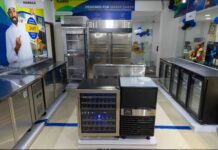
The KHS Group and Ferrum AG are intensifying their longstanding cooperation. Pending approval from antitrust authorities, KHS will be acquiring a stake in Ferrum Packaging AG. The aim is to optimally bundle the competencies of both machine-engineering companies to form a common system portfolio to provide integrated customer systems. At the same time, customers will also benefit in the future from well-thought-out, one-stop-shop services.
The KHS Group and Ferrum AG have been working together in the can segment for years. Dortmund full-service provider KHS values most of its Swiss partner’s innovative machine technology and its expertise based on many years of experience, emphasizing Martin Resch, chief financial officer in charge of purchasing at KHS. “Ferrum is the worldwide well-known manufacturer of can seamers. Combined with our future-oriented solutions in the field of filling and packaging technology, we form an effective union that is valued highly in the market.”
According to the press statement, the two engineering companies are now intensifying their cooperation even further. Ferrum Packaging AG was founded as a subsidiary of Ferrum AG and incorporated Ferrum’s entire worldwide can seaming business. KHS will be acquiring minority ownership in Ferrum. At the same time, Ferrum Packaging Inc, the US subsidiary of Ferrum Packaging AG, will be taking over KHS’s seaming business with its employees and integrating it into the joint offer.
Intelligently combined system solutions
The merger aims to develop and globally market joint solutions. To date, the KHS Group has offered tried and tested Ferrum can seamers only as accessory components for its canning lines. Effective immediately, working in close cooperation will begin developing even more efficient systems, including a filler-seamer block. “Based on skilled future planning of technical components, block solutions are to be designed to be as integrative as possible and do away with redundant functions,” says Siegmar Stang, executive vice president Wet Area at KHS.

Combined filler-seamers designed for the maximum capacity class are planned with clear benefits for the overall process, as Oliver Bühler, chief technical officer of Ferrum Packaging, explains. “We don’t want to merely present one solution; we want to develop a comprehensive system portfolio that meets the needs of every customer while offering clear customer benefits.” The two partners have set themselves as targets for their new developments a lower total cost of ownership (TCO) through shorter changeover times and more rapid sanitizing phases. In addition, the hygienic environment of the systems is to be further optimized.
Comprehensive one-stop-shop services
KHS said that intensified cooperation would also bring about extensive customer benefits in the area of customer service. All services for combined systems from KHS and Ferrum will be offered from a single source in the future. “This will not only reduce the effort for our customers, they will also benefit from shorter machine wait and downtimes,” explains Beat Bühlmann, president of the Board of Directors at Ferrum.

The planned services include joint overhauls of the systems and integration of the KHS remote maintenance system ReDiS (Remote Diagnostic Service). Coordinating the supply of spare parts, according to KHS, will also result in improvements in discontinuation management to ensure continued operation of the machines and thus the availability of systems.
IndiFoodBev — authentic, impactful and influential
An English-language food and beverage processing and packaging industry B2B platform in print and web, IndiFoodBev is in its third year of publication. It is said that the Indian food and beverage industries represent approximately US$ 900 billion in revenues which implies more than 20% of the country’s GDP. Eliminating the wastage on the farmside can help to deliver more protein to a higher number of the population apart from generating sizable exports. The savings in soil, seeds, water, fertilizer, energy and ultimately food and nutrition could be the most immense contribution that country is poised to make to the moderation of climate change.
To improve your marketing and grow sales to the food and beverage processing and packaging industry, talk to us. Our research and consulting company IppStar [www.ippstar.org] can assess your potential and addressable markets in light of the competition. We can discuss marketing, communication, and sales strategies for market entry and growth.
Suppliers and service providers with a strategy and budget for targeted marketing can discuss using our hybrid print, web, video, and social media channels to create brand recognition linked to market relevance. Our technical writers are ready to meet you and your customers for content.
The second largest producer of fruit and vegetables in the world is continuously expanding processing capacities and delivery systems with appropriate innovative technologies. We cover product and consumer trends, nutrition, processing, research, equipment and packaging from farm to thali. Get our 2025 media kit and recalibrate your role in this dynamic market. Enhance your visibility and relevance to existing markets and turn potential customers into conversations. Ask for a sample copy of our bi-monthly in print or our weekly IndiFoodBev eZine each Wednesday.
For editorial info@ippgroup.in — for advertisement ads1@ippgroup.in and for subscriptions subscription@ippgroup.in
Naresh Khanna – 10 February 2025
Subscribe Now










